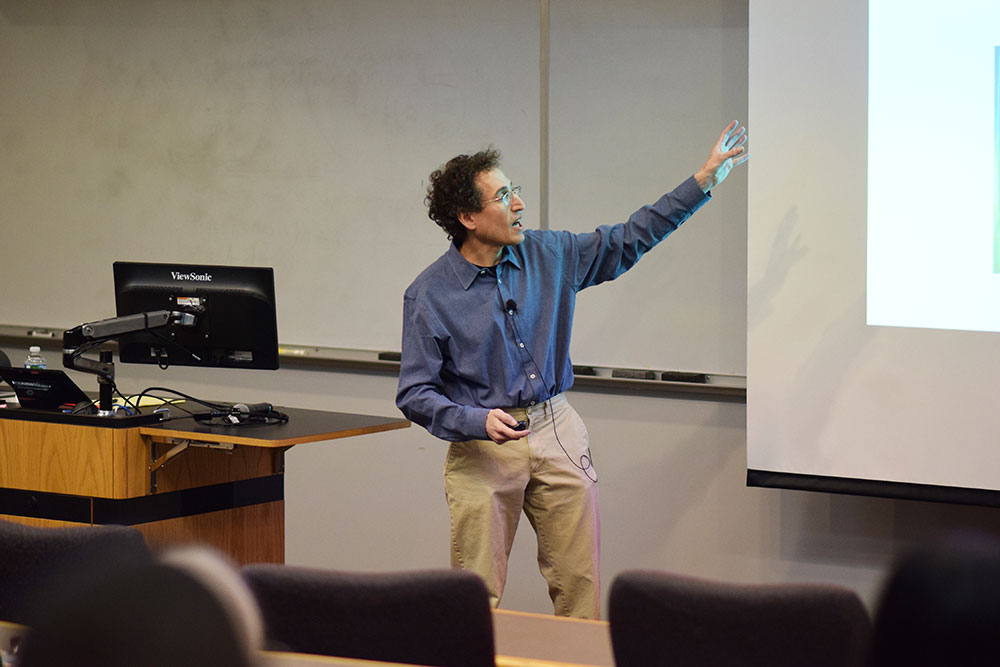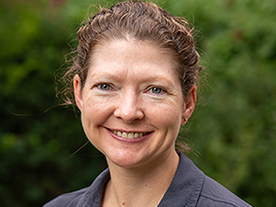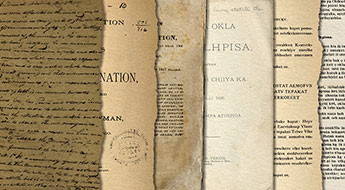Polarizing Trust in Science
IPR’s James Druckman shows Americans’ trust in science drove who got vaccinated during COVID, more than partisanship
Get all our news
There's been this polarization of trust in science, and it has significant consequences for both individuals and the political system at large.”
James Druckman
IPR political scientist

IPR political scientist James Druckman discusses his research on trust in science at an IPR colloquium on Nov. 27, 2023.
During the pandemic, the United States quickly responded to the health crisis by developing coronavirus tests and creating a vaccine a little over a year after the COVID-19 outbreak. Despite the swift response to produce vaccines, America had more COVID-19 deaths per capita than other high-income nations, partially because the U.S. did not vaccinate as many people as other countries.
While some point to the political polarization over protocols like masking and social distancing as the reason for the high death toll, IPR political scientist James Druckman argues that trust in science had a larger effect on whether individuals followed COVID-19 health guidelines or chose to get vaccinated.
“There's been this polarization of trust in science, and it has significant consequences for both individuals and the political system at large,” Druckman said at a Nov. 27 IPR colloquium, where he discussed his ongoing research on the topic.
In 1973, 47% of Republicans and 38% of Democrats said they trusted scientific institutions, according to a survey by the General Social Survey (GSS). In 2022, 28% of Republicans and 53% of Democrats said the same. These numbers reflect the growing polarization of trust in science over the last several decades, Druckman explained.
Part of the change in Republicans’ trust of science can be traced back to the shifting identities of the political parties in the last half of the 20th century. During the Civil Rights Movement, Southern Democratic voters became Republican as many White and wealthy voters shifted to the GOP, while evangelical Christians started to align with the Republican party in the 1980s. Elite rhetoric from conservative think tanks also spread anti-science messages such as climate denialism.
As people became more polarized in their trust in science, they became more likely to dislike the other party. Druckman says the consequence of this is that “the polarization of science leads to the politicization of science,” which eventually impacts policy.
“You get people from different parties making different decisions, because they have different levels of trust in science,” Druckman said.
To understand how trust in science influence COVID-19 behaviors, Druckman examined survey data from the COVID States Project, which he co-leads with colleagues from Harvard, Rutgers, and Northeastern universities. The project includes 28 waves of surveys looking at COVID-19 attitudes and behaviors collected from over 500,000 participants between 2020 and 2023.
The surveys show that trust in science, compared to political affiliation, had equal or greater effect on whether people engaged with COVID-19 information and if they believed misperceptions about COVID-19. Trust in science had a much greater impact on whether people followed COVID-19 behaviors like avoiding contact with others and getting vaccinated. When the researchers asked what drove people’s vaccines decisions in summer 2021, “trust” and “vaccine” were the words most frequently used by people who did not get vaccinated, showing the role distrust in science played in their decision.
To understand this relationship within states, Druckman and colleagues looked at the relationship between COVID-19 deaths by state and other decisions and incidents in the past that are driven by trust in science—such as getting the flu vaccine or dying from a firearm. They find that a state’s number of deaths due to car accidents—which tend to be driven by not wearing seat belts or driving while intoxicated—is a particularly good predictor of whether a state would have a high COVID-19 death rate.
In examining these datasets and voting records, they show that in the 1976 presidential election, people in states with high death rates from car accidents and COVID-19 voted equally for presidential candidates from both parties. But in the 2020 election, states with these same high death rates were much more likely to vote Republican. This, Druckman says, points to the major consequence of states’ polarizing trust in science: Worse health outcomes for their residents.
“We have seen this polarization not just at the individual level with consequences for individual outcomes and wellbeing, but we've seen it at the state level,” Druckman said.
Another outcome is that when parties put their trust in different sources for scientific evidence, it can lead to different policies across states, leaving us with a “fractured nation,” he says.
Despite this divide, the silver lining is that most Americans do have some trust in science, according to the COVID States Project and GSS surveys. To increase trust in science, Druckman says it’s crucial to separate it from partisan identity. Communicating scientific evidence clearly with public officials and their constituents can also build trust, along with diversifying the voices sharing scientific findings.
“The more we diversify science, the more we diversify the messengers of scientific information, the more we can build trust in science,” he said.
James Druckman is the Payson S. Wild Professor of Political Science and IPR associate director and fellow.
Published: December 14, 2023.


